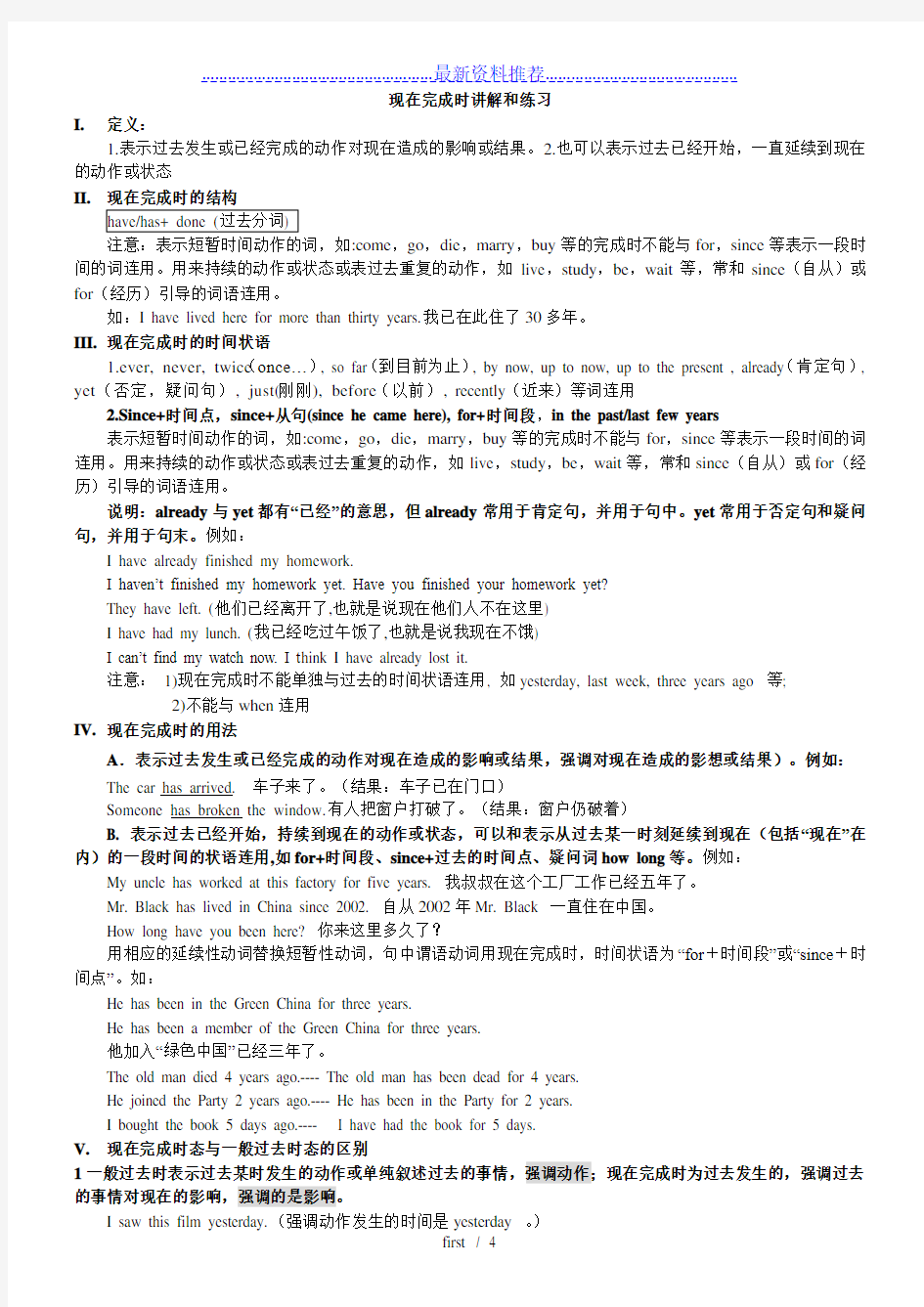

现在完成时讲解和练习
I.定义:
1.表示过去发生或已经完成的动作对现在造成的影响或结果。
2.也可以表示过去已经开始,一直延续到现在的动作或状态
II.
注意:表示短暂时间动作的词,如:come,go,die,marry,buy等的完成时不能与for,since等表示一段时间的词连用。用来持续的动作或状态或表过去重复的动作,如live,study,be,wait等,常和since(自从)或for(经历)引导的词语连用。
如:I have lived here for more than thirty years.我已在此住了30多年。
III.现在完成时的时间状语
1.ever, never, twice(once…), so far(到目前为止), by now, up to now, up to the present , already(肯定句), yet(否定,疑问句), just(刚刚), before(以前), recently(近来)等词连用
2.Since+时间点,since+从句(since he came here), for+时间段,in the past/last few years
表示短暂时间动作的词,如:come,go,die,marry,buy等的完成时不能与for,since等表示一段时间的词连用。用来持续的动作或状态或表过去重复的动作,如live,study,be,wait等,常和since(自从)或for(经历)引导的词语连用。
说明:already与yet都有“已经”的意思,但already常用于肯定句,并用于句中。yet常用于否定句和疑问句,并用于句末。例如:
I have already finished my homework.
I haven’t finished my homework yet. Have you finished your homework yet?
They have left. (他们已经离开了,也就是说现在他们人不在这里)
I have had my lunch. (我已经吃过午饭了,也就是说我现在不饿)
I can’t find my watch now. I t hink I have already lost it.
注意:1)现在完成时不能单独与过去的时间状语连用, 如yesterday, last week, three years ago 等;
2)不能与when连用
IV.现在完成时的用法
A.表示过去发生或已经完成的动作对现在造成的影响或结果,强调对现在造成的影想或结果)。例如:
The car has arrived.车子来了。(结果:车子已在门口)
Someone has broken the window.有人把窗户打破了。(结果:窗户仍破着)
B. 表示过去已经开始,持续到现在的动作或状态,可以和表示从过去某一时刻延续到现在(包括“现在”在内)的一段时间的状语连用,如for+时间段、since+过去的时间点、疑问词how long等。例如:My uncle has worked at this factory for five years. 我叔叔在这个工厂工作已经五年了。
Mr. Black has lived in China since 2002. 自从2002年Mr. Black 一直住在中国。
How long have you been here? 你来这里多久了?
用相应的延续性动词替换短暂性动词,句中谓语动词用现在完成时,时间状语为“for+时间段”或“since+时
间点”。如:
He has been in the Green China for three years.
He has been a member of the Green China for three years.
他加入“绿色中国”已经三年了。
The old man died 4 years ago.---- The old man has been dead for 4 years.
He joined the Party 2 years ago.---- He has been in the Party for 2 years.
I bought the book 5 days ago.---- I have had the book for 5 days.
V.现在完成时态与一般过去时态的区别
1一般过去时表示过去某时发生的动作或单纯叙述过去的事情,强调动作;现在完成时为过去发生的,强调过去的事情对现在的影响,强调的是影响。
I saw this film yesterday.(强调动作发生的时间是yesterday 。)
I have seen this film.(强调对现在的影响,电影的内容已经知道了。)
2一般过去时和表示过去的时间状语连用,如:…ago, last week/...
In 2008, in the past, just now, the day before yesterday, yesterday ...then(那时),that day, one day, once(从前)
现在完成时常和recently(近来),ever, never, twice,so far, by now, up to now, up to the present(到目前为止), since,for,in the past/last few years , already(肯定句), yet(否定,疑问句), just(刚刚), before(以前)连用。现在完成时不与表示过去的时间状语连用。现在完成时可表示持续到现在的动作或状态,动词一般是延续性的,如live, teach, learn, work, study, know.
VI.比较have/has been to、have/has gone to 和have been in
have(has) been to...表示“曾去过某地,已经从那里回来了”,可以和ever、never、twice等连用。have(has) gone to表示“已经去了某地,在去那里的途中或到达那里还没有回来”。have(has) been in 表示“在某地呆多长时间”,常与表示一段时间的状语连用,如:since, for, how long 等
He went to Shanghai last week 上周他去了上海
He has been to Shanghai.
他(曾经)到/去过上海.(但他人现在肯定不是在上海而是回来了)
He has gone to Shanghai.
他已经去上海了.(也许刚动身出发,也许已经到了,也许还在路上,反正他人不在这里)
Mr. Brown has been in Shanghai for three days.
布朗先生来上海已经有三天了
语法练习
单项选择
( )1.The famous writer _____ one new book in the past two year .
A. is writing B.was writing C.wrote D.has written ( )2.Have you met Mr. Li ____?
A. Just B. ago C.before D.a moment ago ( )3.—How long have you ____ here ? —About two months .
A. been B. gone C. come D. arrived ( )4.—Our country ____ a lot so far .
—Yes. I hope it will be even ______ .
A. has changed ; well B. changed ; good C. has changed ; better D. changed; better ( )5.—______ you ___ your homework yet ?—Yes. I _____ it a moment ago.
A.Did; do; finished B.Have; done; finished
C.Have; done; have finished D. will; do; finish
( )6.We ______ Xiao Li since she was a little girl .
A. know B. had known C. have known D. knew
( )7.Harry Potter is a very nice film. I _____ twice.
A. will see B. have seen C. saw D.see
( )8.—These farmers have been to the United States .
—Really? When _____ there ?
A. will they go B.did they go C. do they go D. have they gone ( )9.Zhou Lang ______already ______in this school for two years .
A. was ; studying B. will ; study C. has ; studied D. are; studying ( )10.His father ______ the Party since 1998 .
A.joined B. has joined C. was in D. has been in ( )11.—Do you know him well ? — Sure .We ______ friends since ten years ago .
A. were B. have been C. have become D. have made ( )12.He has ___ been to Shanghai, has he ?
A. already B.never C.ever D. still
( )13.Hurry up! The play __________ for ten minutes .
A. has begun B. had begun C. has been on D. began
( )14.It ___ ten years since he left the army .
A. Is B. has C. will D. was
( )15.Miss Green isn't in the office. She_______ to the library.
A.has gone B. went C.will go D. has been
( )16.My parents ______ Shandong for ten years.
A. have been in B. have been toC. have gone to D. have been ( )17.The students have cleaned the classroom, ____?
A. so they
B. don’t they
C. have they
D. haven’t they ( )18.has Mr. White been a member of Greener China since heto China?
A. How soon, comes
B. How often, got
C. How long, came
D. How far, arrived
( )19.His uncle for more than 9 years.
A. has come here
B. has started to work
C. has lived there
D. has left the university
( )20.His father ______ the Party since 1978 .
A. joined
B. has joined
C. was in
D. has been in
延续性动词和瞬间性动词之间的转化
1.He died 10 years ago.
——He ______________ for 10 years / since 10 years ago. 2. He borrowed the book 2 weeks ago.
——He _____________the book for 2 weeks.
3. He bought the motorbike a month ago.
——He ___________the motorbike for a month.
4. He arrived here three days ago.
——He ____________here since three days ago.
5. They turned off the light 2 hours ago.
—— The light __________for 2 hours.
6. He left here 2 years ago.
—— He ____________from here for 2 years.
7. The film began 30 minutes ago.
——The film __________ for 30 minutes.
8. They opened the door an hour ago.
—— The door __________ for an hour.
9. They closed the door an hour ago.
——The door ___________for an hour.
10. He joined the army last year.
——He _____________ the army for a year.
——It ___________ a year ____________ he joined the army.